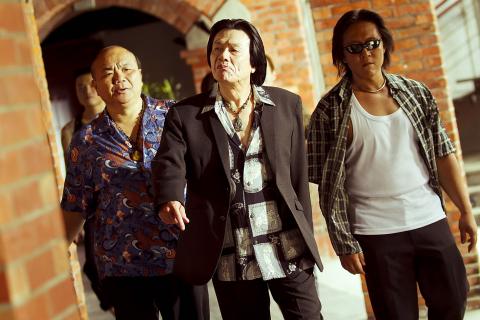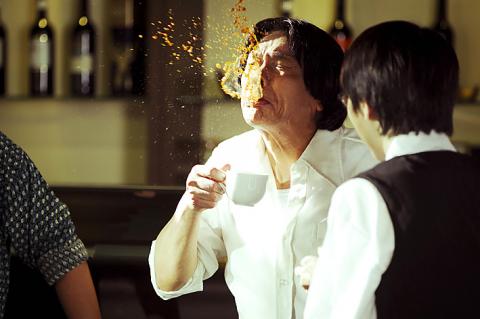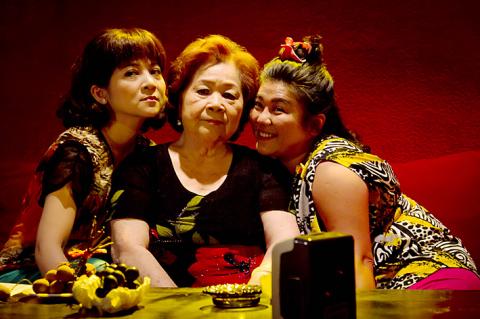A debut feature by Chiu Li-kwan, a big shot in the entertainment business whose career spans nearly 30 years, David Loman brings back bawdy humor and grassroots comedy that have subsided after the heyday of stand-up comedian Chu Ko Liang (豬哥亮), who rose to superstardom and became a household name in the 1980s. Tailor-made for the now 66-year-old Liang, the movie is a well-executed work of entertainment highlighting off-color humor without compromising a solid story line.
Liang plays David Loman, a simple country bumpkin who accidentally becomes a big boss in the criminal underworld. A decade passes, and life seems to go on as usual — drinking tea, solving everyday problems for locals and receiving “protection fees” — until one day a deity tells David through a medium that he needs to find a double to avoid a catastrophe. Panicky, the boss seeks help from Old Ho, a fortune teller also played by Liang, who agrees to pass as David for a few days, but is assassinated when attending a gathering with fellow gangsters.
The mastermind behind the killing is Pinch Junior, played by funnyman Kang Kang (康康), the son of the late Boss Pinch, who passed his authority on to David 10 years previously.

Photo courtesy of Polyface Entertainment Media Group
Blaming David for his father’s death, Xiao Ho (Tony Yang, 楊祐寧) soon reconciles with the boss who vows to avenge Ho’s murder. They become apprentices to Silly Pork, played by veteran actor Chen Po-cheng (陳博正), a kung-fu warrior who used to be a bodyguard for former president Lee Teng-hui (李登輝), and quickly masters the one-finger, martial-arts technique.
It doesn’t take long before David’s estranged daughter Jin (Amber Kuo, 郭采潔) finds out the truth and joins the team. Fighting bad guys at night, the three masked fighters win popularity among locals, and in the process, David is also able to make up for lost time and rebuild the father-daughter relationship with Jin.
The day of reckoning arrives when Pinch Junior holds a public memorial ceremony for his late father and declares his legitimacy as the rightful big boss.

Photo courtesy of Polyface Entertainment Media Group
Wearing a floral print shirt and wooden clogs, Liang thrives in the title role as a good-natured, foul-mouthed old man constantly hurling quips and risque jokes that often involve a fixation with the male and female sex organs. The film’s boisterous and boorish humor relies heavily on cleverly written wordplay in Mandarin, English and Hoklo (commonly known as Taiwanese). A good example can be found in the title of the movie, which is a phonetic translation of “underworld boss” in Hoklo.
While Liang’s untamed humor recalls the pre-feminist era, director Chiu updates her comedy with contemporary elements such as the syndicate using Facebook to boost its popularity. More interestingly, the conventions of kung-fu and superhero movies are borrowed to create a comic, satirical effect. The elegant moves of wing chun (詠春) are replaced by the one-finger technique which can be easily mastered by banging one’s finger with a hammer. And the much revered deity Guan Gong (關公) becomes an inspiration to the trio of homegrown superheroes and heroine. To director Chiu’s credit, no comic segment ever spins out of control or is disconnected from the rest of the movie, showing an all-too-rare ability to weave seemingly peripheral humor into a sensible whole.
Meanwhile, romance kindles between Kuo and Yang, who make a lovable on-screen couple, though the toothsome Yang looks nothing like a zhainan (宅男) — the Taiwanese equivalent of the Japanese otaku, or nerd — even wearing a pair of black-rimmed glasses. The movie is also delightfully supported by a string of cameos by actors and entertainers including actress Su Chu (素珠), Jeff Huang (黃立成), Ma Nien-hsien (馬念先) and Yin Wei-min (應蔚民), better known as Clipper Xiao Ying (夾子小應).

Photo courtesy of Polyface Entertainment Media Group
Fast-paced and packed with bawdy humor, David Loman should do well at the box office over the Lunar New Year, which sees several Taiwanese movies hitting the big screen to entertain the holiday crowds.

Photo courtesy of Polyface Entertainment Media Group

Photo courtesy of Polyface Entertainment Media Group

William Liu (劉家君) moved to Kaohsiung from Nantou to live with his boyfriend Reg Hong (洪嘉佑). “In Nantou, people do not support gay rights at all and never even talk about it. Living here made me optimistic and made me realize how much I can express myself,” Liu tells the Taipei Times. Hong and his friend Cony Hsieh (謝昀希) are both active in several LGBT groups and organizations in Kaohsiung. They were among the people behind the city’s 16th Pride event in November last year, which gathered over 35,000 people. Along with others, they clearly see Kaohsiung as the nexus of LGBT rights.

Jan. 26 to Feb. 1 Nearly 90 years after it was last recorded, the Basay language was taught in a classroom for the first time in September last year. Over the following three months, students learned its sounds along with the customs and folktales of the Ketagalan people, who once spoke it across northern Taiwan. Although each Ketagalan settlement had its own language, Basay functioned as a common trade language. By the late 19th century, it had largely fallen out of daily use as speakers shifted to Hoklo (commonly known as Taiwanese), surviving only in fragments remembered by the elderly. In

Dissident artist Ai Weiwei’s (艾未未) famous return to the People’s Republic of China (PRC) has been overshadowed by the astonishing news of the latest arrests of senior military figures for “corruption,” but it is an interesting piece of news in its own right, though more for what Ai does not understand than for what he does. Ai simply lacks the reflective understanding that the loneliness and isolation he imagines are “European” are simply the joys of life as an expat. That goes both ways: “I love Taiwan!” say many still wet-behind-the-ears expats here, not realizing what they love is being an

In the American west, “it is said, water flows upwards towards money,” wrote Marc Reisner in one of the most compelling books on public policy ever written, Cadillac Desert. As Americans failed to overcome the West’s water scarcity with hard work and private capital, the Federal government came to the rescue. As Reisner describes: “the American West quietly became the first and most durable example of the modern welfare state.” In Taiwan, the money toward which water flows upwards is the high tech industry, particularly the chip powerhouse Taiwan Semiconductor Manufacturing Co (TSMC, 台積電). Typically articles on TSMC’s water demand